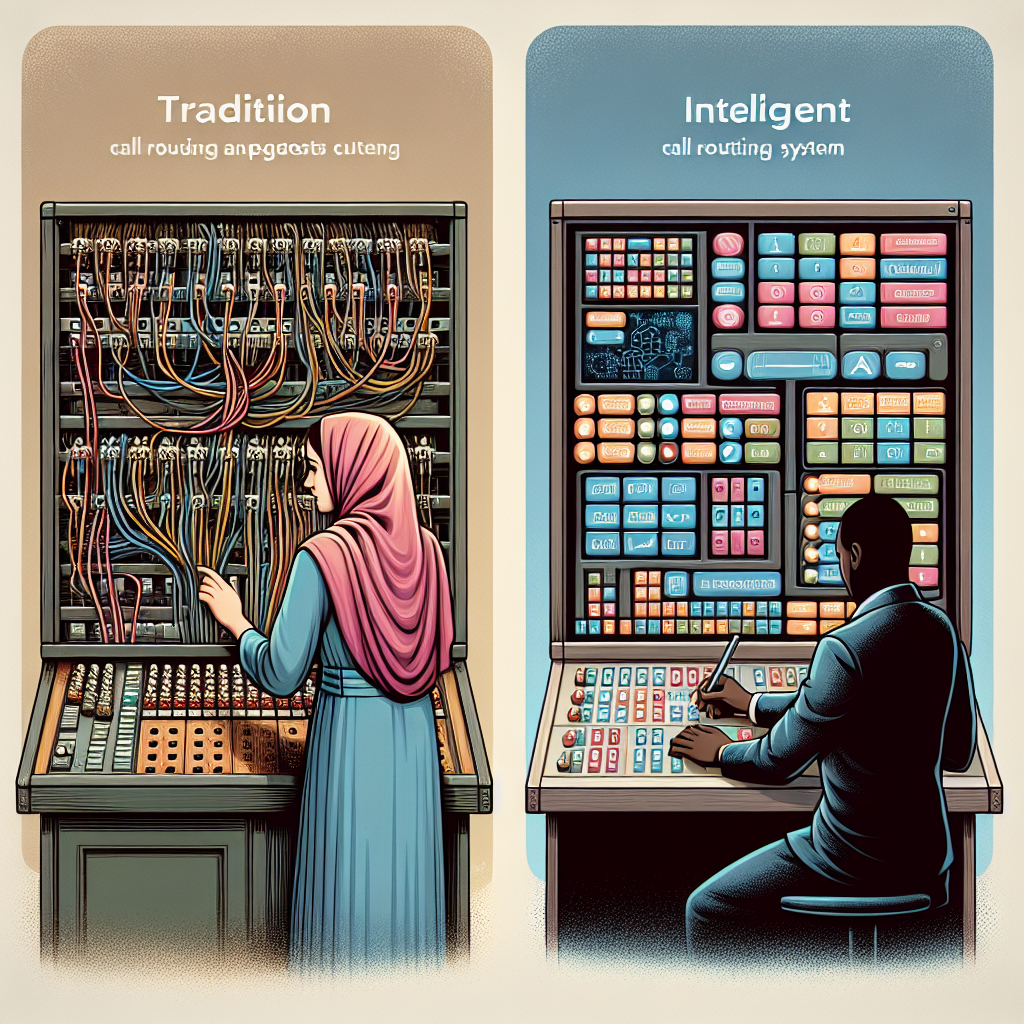
In the digital age, where customer expectations are constantly evolving, businesses are searching for innovative ways to streamline their service delivery models. One such method is the use of Intelligent Call Routing, an advanced system that diversifies from traditional phone routing ideas to enhance customer experience and operational efficiency. (source)

Unlike conventional call routing, intelligent call routing leverages the power of artificial intelligence and customer analytics. It goes beyond merely directing calls to available agents. This sophisticated system analyses customer data, including their past interactions, to route calls to the most appropriate agent. But, the true differentiator lies in its ability to factor in the Customer Lifetime Value (CLV). This strategic approach empowers businesses to prioritize high-value customers, thus enhancing customer retention while increasing profitability. (source)
By considering the CLV, companies no longer treat all customer calls equally. High-value customers or those with potential to be high-value are efficiently routed to experienced or specialized service representatives, offering a premium service to these customers. From a business perspective, this holds promise for increased trust, improved sales opportunities, and a heightened level of customer satisfaction. (source)
The implementation of Intelligent Call Routing based on CLV is a strategic enhancement paving the way for businesses to create personalized customer interactions. By fusing artificial intelligence with a customer's lifetime value, companies are making strides towards delivering outstanding customer experiences, while simultaneously driving their operational efficiency to new heights.
Understanding the concept of Customer Lifetime Value (CLV) is paramount for any business looking to optimize its customer engagement and retention strategies. Based on a Harvard Business Review study, it is a fact that increasing customer retention rates by 5% increases profits by 25% to 95%. The key to achieving this retention lies in personalizing customer experience, and that's where intelligently routing calls based on the CLV comes into play.
So, what exactly is CLV? It is the total profit a business can derive from their entire relationship with a customer. It's not about the immediacy of a single transaction, but the long-term relationship fostered over multiple interactions. By understanding the CLV of each customer, businesses can personalize their interactions and service delivery to better meet the needs of the client, all while managing their resources more efficiently.
Consider the following scenario: Your call center receives numerous calls at once. How does it determine which call to prioritize? A traditional routing strategy might simply redirect the call to the next available agent. However, by employing an intelligent call routing strategy based on the CLV of each caller, your system can redirect important customers to your best agents, ensuring an optimal experience for your most valuable clients.
The goal is to personalize the customer experience, which involves more than merely answering calls promptly. It means fully grasping the customer's history and needs to better assist them and enhance their overall experience. By incorporating CLV into your approach, you can ensure that high-value customers always receive top-notch service, contributing to their satisfaction and their decision to remain loyal to your business.
In the realm of resource allocation too, CLV based call routing helps. By focusing your best resources on high-value customers, you ensure your profitability while still meeting the needs of all customers. In other words, you're achieving more with less—a smart move for any business in today's competitive landscape.
In conclusion, understanding and utilizing CLV is a fundamental component of an effective business strategy. Incorporating it into intelligent call routing strategies ensures that your services are not only personalized but also efficient, contributing to a healthier bottom line and happier customers.
Artificial Intelligence (AI) and advanced analytical tools are at the heart of assessing Customer Lifetime Value (CLV) and enabling smart call routing. These technologies form the core of efficient Intelligent Call Routing systems.

AI-engines are programmed to learn customer behaviour over time using machine learning algorithms. This smart pattern analysis allows the AI to predict Customer Lifetime Value with remarkable accuracy. In-depth examination of AI in predicting CLV reveals the capacity of these systems to monitor and evaluate customer interaction data in real-time.
Advanced analytics tools, whether standalone or integrated into AI systems, play a significant role in interpreting the real-time data generated from various customer touchpoints. These tools can analyze customer behaviour, preferences, and interactions to assess the potential CLV. Tools such as Google Analytics and SAS Customer Intelligence provide insight into customer's overall online journey and behaviour over time.
With real-time customer data and CLV evaluations in hand, Intelligent Call Routing systems can automatically route callers, priority clients get connected to the most experienced agents or specialized teams. This dynamic process increases customer satisfaction, improves resolution rates, and ultimately, boosts revenue. More on how these routing strategies work can be read on Call Centre Helper.
Artificial intelligence and analytics in conjunction provide the backbone for Intelligent Call Routing Based on Customer Lifetime Value. These cutting-edge technologies allow businesses to make data-driven decisions, streamline operations, and enrich the customer experience, all in real-time.
Intelligent Call Routing Based on Customer Lifetime Value (CLV) has been a game-changer for various sectors, delivering prominent improvements in customer satisfaction and business growth. Using CLV-based routing, companies prioritize calls from high-value customers, ensuring that they receive fast, proficient, and personalized service. Several compelling case studies validate the immense potential of this system.
The telecommunications sector was one of the first adopters of intelligent call routing based on CLV. A renowned telecommunication company had an issue with long waiting times and low customer satisfaction scores; however, once they implemented CLV-based intelligent routing, their First Call Resolution rate increased significantly. With more valuable customers being routed to the most competent service agents, customer satisfaction surged, directly influencing CLV and churn rate.
Another noteworthy example comes from the banking sector. One banking giant dealing with numerous daily customer calls faced the challenge of effectively servicing the wide spectrum of customer values. The introduction of CLV-based call routing transformed the scenario, enabling the bank to instantly identify and prioritize high-value customers. As a result, the bank has seen notable improvements in customer retention and upselling of their services.
In the highly competitive e-commerce sector, a market leader successfully used CLV-based routing to cut down customer wait times and enhance overall satisfaction. By integrating CLV into their customer service operations, the company now quickly and effectively routs customer complaints and issues, leading to significantly improved customer experiences.
Overall, these case studies show that investing in intelligent call routing based on Customer Lifetime Value can reap significant rewards in enhancing both customer satisfaction and business growth. The lessons learned are clear: Understanding and valuing customer potential are key to providing excellent service and growing a successful business.
Implementing an intelligent call routing system based on Customer Lifetime Value (CLV) can provide several benefits to businesses, including improved customer service and maximized revenue. However, there are potential hurdles to consider in its implementation, encompassing aspects like data privacy and continuous system maintenance.

The first major challenge revolves around data privacy. As companies use CLV data to route calls, they need to ensure that they are compliant with the various data privacy laws across different regions. Sensitive customer data must be handled and stored securely to prevent breaches that can result in heavy fines and reputational damage. Furthermore, customers' trust could be irreversibly affected if they feel their private information is not safe.
The second key concern is the need for regular updates and maintenance. Intelligent call routing systems, like other AI technologies, rely on machine learning algorithms which improve over time through training on newer data. Therefore, businesses need to provide continuous updates to the system to maintain its efficiency and effectiveness. Additionally, regular technical maintenance is required to avoid system downtimes, which could lead to customer dissatisfaction and potential loss of business.
Despite these challenges, the benefits of intelligent call routing based on CLV often outweigh the potential downsides. By appropriately addressing these concerns, businesses can effectively harness the power of AI to enhance customer service and drive growth. As the increasingly competitive market demands innovative customer service tools, intelligent call routing is poised to be a game-changer.
As technology continues to evolve and customer expectations shift, the future of intelligent call routing remains promising and full of potential developments. Specifically, advancements in Artificial Intelligence (AI) and Machine Learning (ML) are anticipated to directly impact Intelligent Call Routing systems. This will be based on the concept of quantifying Customer Lifetime Value (CLV).
AI has always been a significant component of intelligent call routing systems. Its role is bound to expand further, fortifying its position as a keystone of customer service. Advancements in natural language processing, conversational AI, and voice recognition are anticipated to enhance the process of categorizing and directing calls towards the most suitable solutions. This enhancement will contribute to a more tailored and efficient customer experience.
Evolution to a more proactive support model is expected. By utilizing information about Customer Lifetime Value (CLV), intelligent call routing systems can prioritize customers based on their value, providing a more personalized and efficient user experience for high-value customers. This system not only improves customer satisfaction but also contributes substantially to the overall growth and revenue of the company.
In terms of customer expectations, the future focus is towards creating a more seamless multichannel experience. The challenge lies in making the transition from one channel to another as frictionless as possible. For example, if a customer starts a conversation in a chatbot and later moves to phone support, the system should remember the previous interactions and route the call accordingly. This approach reduces repetitiveness, saving both the customer’s time and the company’s resources. Considering how a customer's journey is no longer linear but spread across numerous channels, this is an aspect of intelligent call routing that carries significant potential.
In this rapidly evolving landscape, organizations must remain agile and forward-thinking, experimenting with new technologies and solutions while keeping customer satisfaction at the forefront of their objectives. The potential advancements in intelligent call routing systems, particularly based on Customer Lifetime Value (CLV), are one such area ripe for exploration in the near future.
Start your free trial for My AI Front Desk today, it takes minutes to setup!








